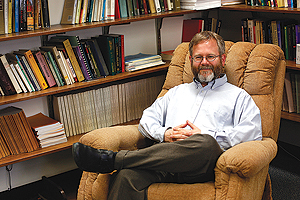Michael Kremer, Professor in Philosophy and the College
By Josh Schonwaldjschonwa@uchicago.edu
News Office
 Photo by Beth Rooney Michael Kremer | |
Michael Kremer’s first encounter with the extreme edge of the Life of the Mind occurred during his first year at Chicago.
To give undergraduates in 20th Century Analytic Philosophy a break from some of philosopher Bertrand Russell’s most complex work, Kremer, Professor in Philosophy and the College, struck several passages from the assignment.
But after the class in which Russell was discussed, one student approached Kremer, skeptically. He had read the missing passages and wanted to know why Kremer had cut them.
Surprised that the student had done the extra reading, Kremer explained his “it’s complex” rationale. The student was nonplussed. But what was even more surprising was that the student had not only read the additional passages, but also had tracked down Kremer’s work on Russell. He had read it and had serious questions. “This had never happened to me before,” recalled Kremer, who had just arrived at Chicago after 16 years at Notre Dame. “I was astonished.”
And it has happened again. “It’s not uncommon here,” and it is one of the joys of teaching at Chicago, said Kremer. “Students here are incredibly, intellectually curious and motivated.”
Kremer, whose primary research interest is early analytic philosophy, has a lot of interaction with curious students. He runs the undergraduate program in Philosophy, teaches in the Core each Winter Quarter, advises several students annually on their A.B. papers and teaches classes in logic to undergraduates.
Kremer, who greatly appreciates being at an institution and department committed to the history of philosophy, said his goals as a teacher are not particularly unusual. “I want to explain the material clearly, get students to understand the material and get them to think about it in new ways.”
But what makes Kremer a well-liked instructor is the way he achieves these goals. He thinks carefully about each class.
One of his biggest challenges in moving from Notre Dame to Chicago, he said, was not the difference in student culture, but in the University calendar. “I had lived in semesters my whole career,” he said. “With a 10-week quarter, you have to be more selective about your material. It’s a mistake to think just because they’re Chicago students, they can read in 10 weeks everything you might assign in a semester elsewhere.”
Figuring out the right reading load for each class often requires mid-class changes.
Currently, he is teaching “Faith and Reason,” which explores arguments for and against the existence of God. The class has a wide range of students, from first-years to advanced Philosophy majors. “I want it to be accessible to the first-years, but still interesting to the seniors. We’ve had to slow down the reading,” he said, “and that will result in cutting out some topics in the last part of the class.”
Another characteristic of Kremer’s approach: He’s always hunting for new pedagogical techniques.
During his Winter Quarter Core class, which covers early-modern philosophy through the 18th century, Kremer unveiled a new technique. He asked students to write questions that would guide discussion. “The questions are often the same that I would ask, but they feel self-generated.” The provenance of the technique was Kremer’s daughter. When she was a prospective, she sat in on a class in which the professor used student-generated questions.
Another technique Kremer sometimes employs is the long, pregnant pause. “Thirty, sometimes 45 seconds,” he said. “Inevitably, someone will speak. I read about it in a book on teaching. You can get helpful ideas from those sources too.”
Teaching, though, is not a selfless endeavor for Kremer.
“Every time I teach material,” he said, “I find something new.” And sometimes it feeds into his work. “I talked about Augustine in a paper on Wittgenstein. I never would have done that if I wasn’t teaching in the Core.”
![[Chronicle]](/images/sidebar_header_oct06.gif)